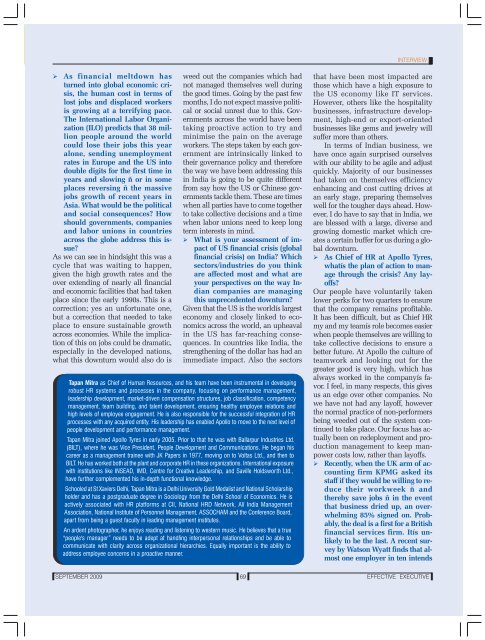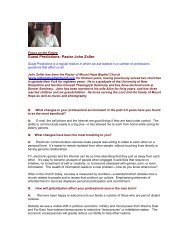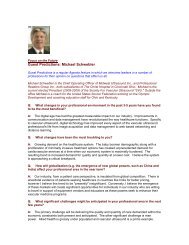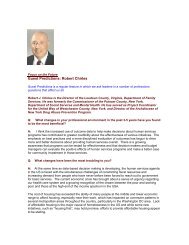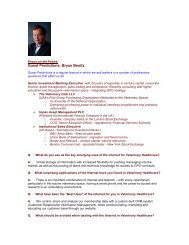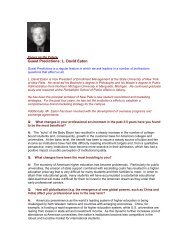Social Cause Marketing - The Regis Group Inc
Social Cause Marketing - The Regis Group Inc
Social Cause Marketing - The Regis Group Inc
Create successful ePaper yourself
Turn your PDF publications into a flip-book with our unique Google optimized e-Paper software.
INTERVIEW<br />
As financial meltdown has<br />
turned into global economic crisis,<br />
the human cost in terms of<br />
lost jobs and displaced workers<br />
is growing at a terrifying pace.<br />
<strong>The</strong> International Labor Organization<br />
(ILO) predicts that 38 million<br />
people around the world<br />
could lose their jobs this year<br />
alone, sending unemployment<br />
rates in Europe and the US into<br />
double digits for the first time in<br />
years and slowing ñ or in some<br />
places reversing ñ the massive<br />
jobs growth of recent years in<br />
Asia. What would be the political<br />
and social consequences? How<br />
should governments, companies<br />
and labor unions in countries<br />
across the globe address this issue?<br />
As we can see in hindsight this was a<br />
cycle that was waiting to happen,<br />
given the high growth rates and the<br />
over extending of nearly all financial<br />
and economic facilities that had taken<br />
place since the early 1990s. This is a<br />
correction; yes an unfortunate one,<br />
but a correction that needed to take<br />
place to ensure sustainable growth<br />
across economies. While the implication<br />
of this on jobs could be dramatic,<br />
especially in the developed nations,<br />
what this downturn would also do is<br />
weed out the companies which had<br />
not managed themselves well during<br />
the good times. Going by the past few<br />
months, I do not expect massive political<br />
or social unrest due to this. Governments<br />
across the world have been<br />
taking proactive action to try and<br />
minimise the pain on the average<br />
workers. <strong>The</strong> steps taken by each government<br />
are intrinsically linked to<br />
their governance policy and therefore<br />
the way we have been addressing this<br />
in India is going to be quite different<br />
from say how the US or Chinese governments<br />
tackle them. <strong>The</strong>se are times<br />
when all parties have to come together<br />
to take collective decisions and a time<br />
when labor unions need to keep long<br />
term interests in mind.<br />
What is your assessment of impact<br />
of US financial crisis (global<br />
financial crisis) on India? Which<br />
sectors/industries do you think<br />
are affected most and what are<br />
your perspectives on the way Indian<br />
companies are managing<br />
this unprecedented downturn?<br />
Given that the US is the worldís largest<br />
economy and closely linked to economics<br />
across the world, an upheaval<br />
in the US has far-reaching consequences.<br />
In countries like India, the<br />
strengthening of the dollar has had an<br />
immediate impact. Also the sectors<br />
Tapan Mitra as Chief of Human Resources, and his team have been instrumental in developing<br />
robust HR systems and processes in the company, focusing on performance management,<br />
leadership development, market-driven compensation structures, job classification, competency<br />
management, team building, and talent development, ensuring healthy employee relations and<br />
high levels of employee engagement. He is also responsible for the successful integration of HR<br />
processes with any acquired entity. His leadership has enabled Apollo to move to the next level of<br />
people development and performance management.<br />
Tapan Mitra joined Apollo Tyres in early 2005. Prior to that he was with Ballarpur Industries Ltd.<br />
(BILT), where he was Vice President, People Development and Communications. He began his<br />
career as a management trainee with JK Papers in 1977, moving on to Voltas Ltd., and then to<br />
BILT. He has worked both at the plant and corporate HR in these organizations. International exposure<br />
with institutions like INSEAD, IMD, Centre for Creative Leadership, and Saville Holdsworth Ltd.,<br />
have further complemented his in-depth functional knowledge.<br />
Schooled at St Xaviers Delhi, Tapan Mitra is a Delhi University Gold Medalist and National Scholarship<br />
holder and has a postgraduate degree in Sociology from the Delhi School of Economics. He is<br />
actively associated with HR platforms at CII, National HRD Network, All India Management<br />
Association, National Institute of Personnel Management, ASSOCHAM and the Conference Board,<br />
apart from being a guest faculty in leading management institutes.<br />
An ardent photographer, he enjoys reading and listening to western music. He believes that a true<br />
"people's manager” needs to be adept at handling interpersonal relationships and be able to<br />
communicate with clarity across organizational hierarchies. Equally important is the ability to<br />
address employee concerns in a proactive manner.<br />
that have been most impacted are<br />
those which have a high exposure to<br />
the US economy like IT services.<br />
However, others like the hospitality<br />
businesses, infrastructure development,<br />
high-end or export-oriented<br />
businesses like gems and jewelry will<br />
suffer more than others.<br />
In terms of Indian business, we<br />
have once again surprised ourselves<br />
with our ability to be agile and adjust<br />
quickly. Majority of our businesses<br />
had taken on themselves efficiency<br />
enhancing and cost cutting drives at<br />
an early stage, preparing themselves<br />
well for the tougher days ahead. However,<br />
I do have to say that in India, we<br />
are blessed with a large, diverse and<br />
growing domestic market which creates<br />
a certain buffer for us during a global<br />
downturn.<br />
As Chief of HR at Apollo Tyres,<br />
whatís the plan of action to manage<br />
through the crisis? Any layoffs?<br />
Our people have voluntarily taken<br />
lower perks for two quarters to ensure<br />
that the company remains profitable.<br />
It has been difficult, but as Chief HR<br />
my and my teamís role becomes easier<br />
when people themselves are willing to<br />
take collective decisions to ensure a<br />
better future. At Apollo the culture of<br />
teamwork and looking out for the<br />
greater good is very high, which has<br />
always worked in the companyís favor.<br />
I feel, in many respects, this gives<br />
us an edge over other companies. No<br />
we have not had any layoff, however<br />
the normal practice of non-performers<br />
being weeded out of the system continued<br />
to take place. Our focus has actually<br />
been on redeployment and production<br />
management to keep manpower<br />
costs low, rather than layoffs.<br />
Recently, when the UK arm of accounting<br />
firm KPMG asked its<br />
staff if they would be willing to reduce<br />
their workweek ñ and<br />
thereby save jobs ñ in the event<br />
that business dried up, an overwhelming<br />
85% signed on. Probably,<br />
the deal is a first for a British<br />
financial services firm. Itís unlikely<br />
to be the last. A recent survey<br />
by Watson Wyatt finds that almost<br />
one employer in ten intends<br />
SEPTEMBER 2009<br />
69<br />
EFFECTIVE EXECUTIVE


